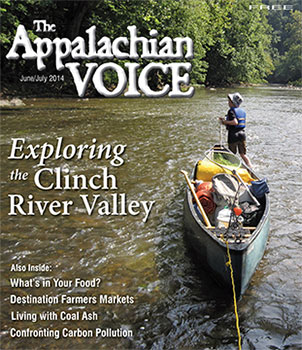Front Porch Blog
You don’t need to travel far to experience a summer rich in laughter and discovery. In this issue of The Appalachian Voice, we scope out some of the region’s most lively farmers markets and showcase the natural beauty of the “Heart of Appalachia,” a region in southwest Virginia hailed as among the most biodiverse in the country.
Writer Megan Northcote explores the growing phenomenon of “destination farmers markets,” which host events and activities that lead Northcote to dub them “more than a market.” Visitors can enjoy cooking and artisan demonstrations, hands-on kids activities, live music and dancing -‒ all while enjoying fresh and delicious food from the surrounding community. And access to this healthy, locally-sourced produce is expanding. From a mobile farmers market in eastern Tennessee to a program in West Virginia where children grow and sell food from their school garden, the way that communities think about food is being transformed all across Appalachia.
At the same time, ecotourism is continuing to gain momentum as a way to promote and protect the natural features that shape a community’s unique identity. In the Clinch River Valley of southwest Virginia, the recent opening of a river tubing outfitter, as well as the development of driving, biking and hiking trails, have been attracting tourists from across the nation. Visitors are enticed by the region’s astounding biodiversity ‒ the crystal-clear waters of the Clinch River are home to more endangered and rare aquatic species than anywhere else in the country ‒ and the famous voices of the region’s musical history steeped in the origins of bluegrass.
Residents, organizations and businesses of the Clinch River Valley are banding together to preserve these assets by working towards the creation of a new state park. The state legislature is still working through the process of funding the park, but in the meantime the issue’s regular Hiking the Highlands column explores some of the trails that already traverse the area. The ability to discover and interact with the outdoors in the Clinch River Valley is further aided by several phone applications ‒ introduced throughout the articles ‒ that provide visitors with guided tours and wildlife interpretation.
Potential threats to our food and environment are also investigated in this issue. Valerie Bruchon analyzes some of the issues surrounding genetically modified food and what it could mean for Appalachia. You can learn more about which food labels exclude genetically modified foods and other controversial components from our “What’s in Your Food” chart.
You can also read about some of the continued difficulties associated with fossil fuel consumption. In “At What Cost?” residents of Belews Creek tell their stories about how coal ash ‒ the toxic byproduct from burning coal ‒ has endangered the health of their community. Brian Sewell examines the need for federal rules to regulate the practice of using coal ash as fill material for abandoned surface and underground mines. And in “Confronting Carbon Pollution,” Molly Moore investigates the Obama administration’s plans to implement carbon pollution regulations for new and existing coal-fired power plants.
Be sure to check out our regular features too. This issue’s Naturalist Notebook takes a look at the Eastern grey treefrog, whose mating song can be heard in Appalachia from April to August. Our This Green House column checks out the European Solar Decathlon, an energy-efficient home design competition. Appalachian State University has teamed up with a French university to compete in the decathlon this June.
Wherever your plans take you this summer, make some time to get outdoors! And while you’re out there, be sure to read this issue of The Appalachian Voice. You can pick up a copy from a newsstand near you, read the online version here or join Appalachian Voices to receive a one-year subscription in your mailbox. Questions or comments? Email voice@appvoices.org, or submit a letter to the editor!
PREVIOUS
NEXT
Related News

Leave a comment
Your email address will not be published. Required fields are marked *

